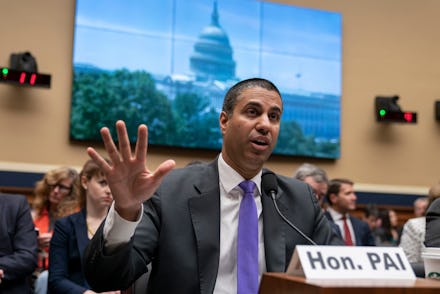Robocalls are taking over, but a new FCC plan aims to finally block them for good

How many times does your phone ring a day, only for you to take a look at the number and see either something shockingly close to your own 10 digits or simply "unknown"? Getting tons of robocalls (often fraudulent phone calls from unassigned or invalid numbers) has plagued Americans over the past year and the sheer number of them has increased to 48 billion, a 36% increase over 2017 levels. The current situation has officially gotten so bad that the Federal Communications Commission (FCC) believes that nearly half of all phone calls made in 2019 will be spam calls.
In an attempt to help phone companies and consumers fight back, the FCC announced on Wednesday that it will be voting on a new measure to allow phone companies like AT&T and Verizon to auto-enroll their customers in a call-blocking program that would automatically screen for robocalls. Technically this option already exists, however customers have to opt-in to it with their individual provider.
“Illegal robocalls can take many forms,” the FCC’s latest report states, “but perhaps the most pernicious are those that try to lure consumers into scams, including identity theft. One example is the ‘IRS scam,’ in which callers pretend to be representing the IRS and claim the called party owes back taxes, with the goal of obtaining money or personal information from the victim.”
While getting a robocall may simply seem annoying, in many cases such as those referenced above, they can be illegal. In early May 2019, the FCC caught and fined the robocall “Kingpin” in Miami, FL, fining him $120 million for sending robocalls to emergency, government service, and residential phone lines.
This week's action comes after FCC chairman Ajit Pai sent a series of letters in November 2018 asking major U.S. phone companies to take robocalls more seriously. As a result, these companies have released a new protocol in January 2019 called Secure Telephone Identity Revisited and Signature-Based Handling of Asserted Information Using Tokens (STIR/SHAKEN) which digitally credentials incoming callers and alerts users when it thinks a robocall is coming through.
However, as you may have noticed, robocalls have continued to be a major problem throughout 2019, hence the FCC action. And while FCC Commissioners will vote on the new measure on June 6th, there are also two other bills up for consideration in the Senate and the House of Representatives that are tackling this challenge.
The Senate bill S.151, called “Telephone Robocall Abuse Criminal Enforcement and Deterrence Act” or the “TRACED Act,” would increase the penalty spammers pay to $10,000 per robocall (up from $1,500). It was introduced in January of 2019 and is still under consideration. As of April there are no scheduled votes on the legislation as it awaits future amendments.
The House bill called the Stopping Bad Robocalls Act contains similar language as the FCC measure currently under consideration, but includes provisions to give the FCC more time to find and conduct through investigations of robocallers. This bill is currently still up for debate after it's latest hearing at the end of April. At the time of this writing there are no next steps listed on the House bill page.
So far, unless the FCC proposal is passed, the only solutions for average cell phone users is to block robocalls as they come in to prevent repeat attempts from the same number, or call your provider to see if they can enroll you in their call-screening program.